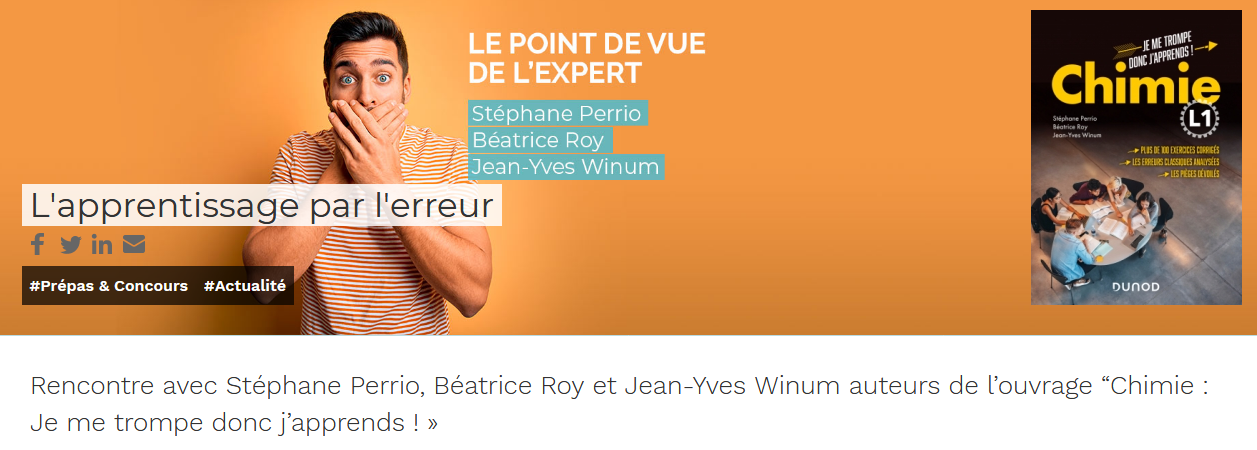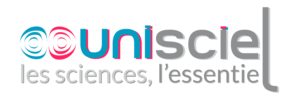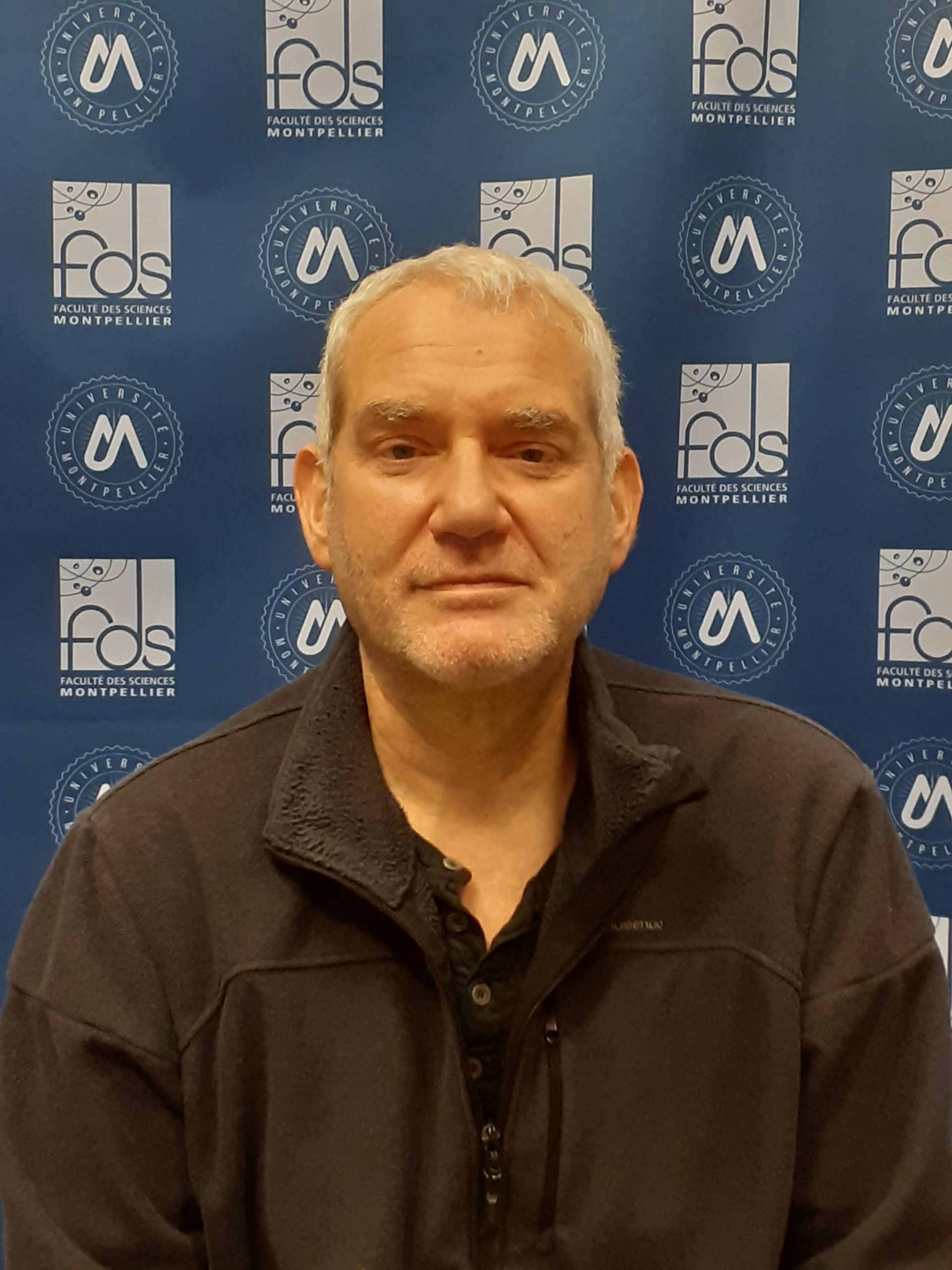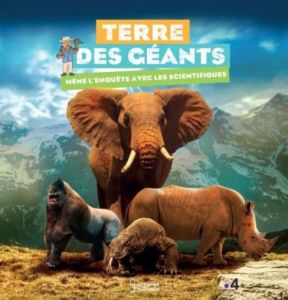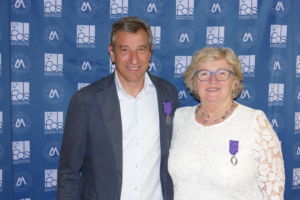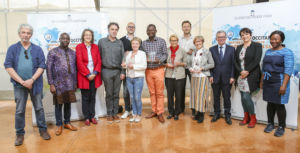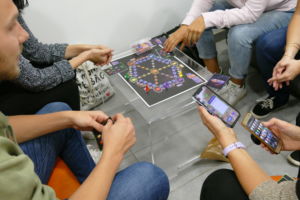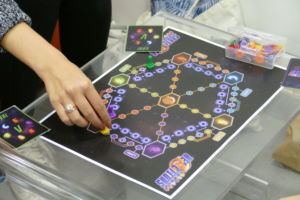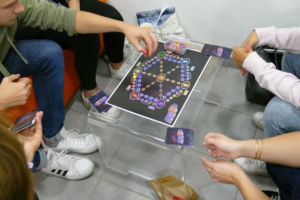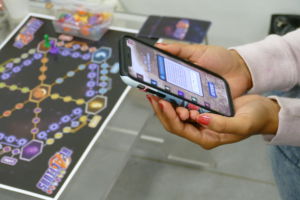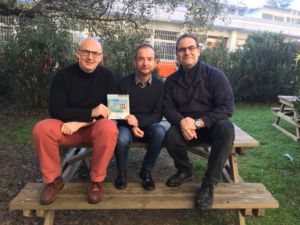Proud of our teachers
Book Chemistry L1: I make mistakes, so I learn!
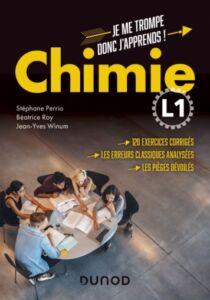 Béatrice Roy and Jean-Yves Winum, teacher-researchers in the Chemistry Department of the Faculty of Science, are co-authors with Stéphane Perrio (teacher-researcher, Université de Caen-Normandie) of the book Chimie L1 : Je me trompe, donc j'apprends !
Béatrice Roy and Jean-Yves Winum, teacher-researchers in the Chemistry Department of the Faculty of Science, are co-authors with Stéphane Perrio (teacher-researcher, Université de Caen-Normandie) of the book Chimie L1 : Je me trompe, donc j'apprends !
Methods, tips and pitfalls to avoid, published by DUNOD.
Published in August 2020, this chemistry textbook is aimed at L1 Plurisciences, PASS and DUT/BTS students. The aim of this book is to help you avoid pitfalls while reinforcing your knowledge of the fundamental concepts of chemistry. It was the subject of an article published in Dunod's Lettre de l'innovation pédagogique in February 2021. https://www.dunod.com/apprentissage-par-erreur
Emilien Azema: Laureate of the Institut Universitaire de France (IUF) Class of 2020
He is one of the 6 winners of the school's Class of 2020.
The winners of the IUF Class of 2020 are :
Émilien Azema
Senior Lecturer
Faculty of Science -Mechanics and Civil Engineering Laboratory (LMGC)
Junior MemberCherine Bechara
Senior Lecturer
Faculty of Science -Institute of Functional Genomics (IGF)
Junior MemberLuca Cipelletti
University Professor
Faculté des Sciences-Laboratoire Charles Coulomb (L2C)
Senior memberOlivier Fontaine
Senior lecturer
IUT Montpellier-Sète - Institut Charles Gerhardt, Montpellier (ICGM)
Junior memberBenoit Nabholz
Senior Lecturer
Faculty of Science -Montpellier Institute of Evolutionary Sciences (ISEM)
Junior MemberFlorence Perrin
University Professor
Faculty of Science-Molecular Mechanisms in Neurodegenerative Dementia (MMDN)
Senior memberThe mission of the Institut Universitaire de France (IUF) is to promote the development of high-level research in universities and to strengthen interdisciplinarity. It is supported by a group of teacher-researchers selected by an international jury for the exceptional quality of their research.
Portrait of Émilien Azema
Emilien Azéma, 40, works on the physics and mechanics of discrete media (granular) with realistic and evolving composition, and is in charge of International Relations at the FdS. He obtained his HDR in mechanics from the University of Montpellier in 2016Through advanced modeling in Discrete Elements, his pioneering work has systematically highlighted the non-linear effects induced by particles with complex shapes (polydispersity in shape) and extended sizes (polydispersity in size) on the behavior (quasi-static to fast flow) of granular systems.Fine micro-mechanical analyses, supported by scale-shifting methods, have enabled us to trace the origins of these behaviours right down to the properties of the particles and their interactions. Gradually, we have turned our attention to so-called "evolutionary" divided materials, taking into account in numerical models the change in particle shape, either through grain fragmentation (brittle materials) or grain deformation (soft materials). This work has benefited from strong international collaborations with, for example, Colombia (Univ. Los Andes), Thailand (Univ. Chiang-mai), Australia (Univ. Newcastle,) or more recently the United States (Univ. Colorado), but also through various collaborations with industry.
Presentation of the project that attracted the attention of the IUF:
The world is made of grains. More than 80% of the raw materials used in human industry, such as pharmaceuticals, agriculture and mining, are made up of grains. Rocks, sand and earth have been used for millennia by human civilizations to build structures, buildings, bridges, roads, etc. Against a backdrop of accelerating degradation of natural resources, new non-convex-grained, potentially deformable granular structures are emerging.Through advanced Discrete Element modelling, the aim is to advance this emerging engineering theme and show how particles with "very exotic" characteristics could lead to intelligent grain-based structures.
UNISCIEL: Faculty of Science online ...
Pedagogical production to support teaching, promotion of the use of digital technology in education, dissemination ofscientific culture, French and international projects, and information on careers and careers guidance.
Marc Rolland, a teacher-researcher in the Faculty of Science, has been involved for many years in pedagogical innovation, ICTE and the production of high-quality digital training resources.
Marc Rolland has been appointed by the Unisciel management board as national editorial manager for the Chemistry section.
Access to these resources is entirely free and open to all students from partner universities such as the University of Montpellier and the Faculty of Science.
For more information on how to use these resources at cours:marc.rolland@umontpellier.fr
UniSciel has ... 4000 module and chapter resources; Nearly 8 million visits per year; 15 million page views per year; 45+ members: universities and higher education and research establishments.
It works to ... Support for the development of resources, Support for the implementation of schools' digital policies (pedagogy), The fight against failure and Professional integration.
Publication of children's book - Terre des Géants (Larousse, 2019)
https://www.editions-larousse.fr/livre/terre-des-geants-9782035952752
Scientific advisor: Pierre-Olivier Antoine (FdS / ISEM)
Palmes Académiques
Anne Heaps Di Costanzo, certified teacher, former Head of the Languages Department at the Faculty of Science
And
- Alain Hoffmann, University Professor, Director of the Faculty of Science
The following are named CHEVALIERS of the Ordre des Palmes Académiques.
Winner of the Pierre Fabre Foundation
Frank Mennechet and his team at the Institut de Génétique Moléculaire de Montpellier (Montpellier, Hérault) have been awarded a Pierre Fabre Foundation prize for their project "Collaborative epidemiological and fundamental studies against adenoviruses in Chad and Burkina Faso, in a global vaccination context".
Sonia Chalbi English teacher - From science to writing
Sonia Chalbi is an English teacher in the DDL (Department of Languages) at the Faculty of Science. But in recent years, her passion for writing and her desire to pass on her love of words have led her to take on two French TU at the Faculty of Science.
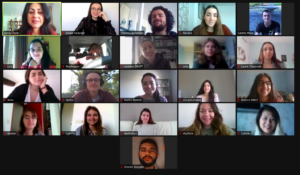 First, Geneviève Degols and now Richard Arinero have entrusted her with a creative writing module for L2 Biology students. Since 2016, students have been able to playfully acquire writing tools and consolidate their spelling around current themes. It's also an opportunity to practise initiative.Dis-moi dix mots from the Semaine de la langue française et de la Francophonie (French Language and Francophonie Week). Every year, off-site workshops take place in cultural venues such asla Panacée, the Photo Barorla Halle Tropismeto encourage students to write around artistic media.
First, Geneviève Degols and now Richard Arinero have entrusted her with a creative writing module for L2 Biology students. Since 2016, students have been able to playfully acquire writing tools and consolidate their spelling around current themes. It's also an opportunity to practise initiative.Dis-moi dix mots from the Semaine de la langue française et de la Francophonie (French Language and Francophonie Week). Every year, off-site workshops take place in cultural venues such asla Panacée, the Photo Barorla Halle Tropismeto encourage students to write around artistic media.
Since 2017, she has been responsible for a Literature course within the L3 Sciences et Technologies jointly run by Nicolas Saby (Faculty of Science) and Valérie Munier (Faculty of Education). The aim of this year's course is to enable non-scientific students to apply for the CRPE competitive examination (Concours de Recrutement de Professeurs des Ecoles) with a set of skills in both the scientific and didactic fields. General culture is also taught, and the French course is part of this approach.
What a wonderful opportunity for science students to sharpen their critical faculties and debate French heritage texts! The UM's participation in the Prix du Roman des Etudiants France Culture Télérama was a chance for the L3 students to get involved in this initiative, which is now an integral part of the course, which also includes an introduction to reading aloud and the production of a Booktube[1][1].
It was precisely as students from the scientific community that they were asked by France Culture to take part in one of the 5 national meetings for the 2020 Prize, broadcast on the website and social networks. Usually conducted in the Radio France studios, this year's interview took place exceptionally via videoconference, and can be viewed HERE. 4 student jurors (Maelis Bejaud, Cynthia Chhun, Arthur Doustaly and Caroline Gruet) worked with Sonia Chalbi to prepare a 1-hour interview with the writer Celia Levi on her novel " La Tannerie ", whose highly topical themes about precarious youth in need of guidance particularly appealed to them.
In their own words, it was an experience rich in emotions and discoveries: the pragmatism of their questions appealed to the writer, who is used to questions focused more on form than substance. Celia Levi and Adrien Landivier (France Culture) were keen to emphasize the relevance of their interventions, and the students felt legitimate in a role usually reserved for the literary sphere. Beyond this wonderful adventure, it was also a personal victory for Sonia Chalbi, who succeeded in instilling in them a taste for reading.
This passionate teacher leads writing workshops in the Papier de Soi structure, which she created after completing the Atelier d'Ecriture Animateur discovery module at Paul Valéry in 2014. She happily combines the discovery of art exhibitions with an introduction to short story writing in a caring, intergenerational setting. Students, working people and retirees come together for mutual enrichment and discover singular universes during a photography festival (les Boutographies, Images Singulières), a writing afterwork at Halle Tropisme or an immersive visit to an artist's studio or gallery.
References:
Dis-moi dix mots 2020 - 2021 (culture.gouv.fr)
Homepage | MO.CO.
Exhibition gallery and association in Montpellier - Le Bar à Photo (baraphoto.fr)
La Halle Tropisme - Montpellier
(20+) Papier de Soi - Ateliers d'écriture Montpellier | Facebook
[1][1] Filmed literary review
"Prerequisites for success - Bachelor of Science (Maths for Science, Physics, Chemistry, Geosciences and Life Sciences)
Publication of an all-in-one book to help students master the requirements for a successful entry into a science bachelor's degree and to support them in their transition from high school to university.
"Prerequisites for success - Bachelor of Science (Maths for Science, Physics, Chemistry, Geosciences and Life Sciences)
Written by 9 authors, all Maitres de Conférences or Professors at the Faculty of Sciences
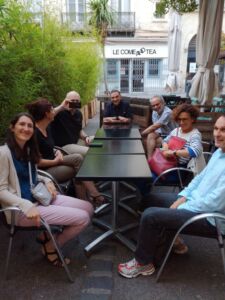 ThibaudETIENNE(Chemistry Department)
ThibaudETIENNE(Chemistry Department)
Jean-Luc AYMERIC (BioMV Department)Rodolphe CATTIN (TEE Department)Anne-Laure DALVERNY (Chemistry Department)Jérôme DORIGNAC (Physics Department)Laila GANNOUN (BioMV Department)Frédéric LEMOIGNO (Chemistry Department)Fleurice PARAT (TEE Department)Nicolas SABY (Mathematics Department)Coralie WEIGEL (Physics Department)https://www.dunod.com/sciences-techniques/prerequis-pour-reussir-licence-sciences-maths-pour-sciences-physique-chimie
Playful teaching in the Chemistry Department of the Faculty of Science
 Béatrice Roy and Jean-Yves Winum of the Chemistry Teaching Departmentcollaborated on the creation of the serious game "Reactions" with the team of Prof. José Nunes da Silva Jr. from the Educational Software Design Laboratory (LDSE) at the Federal University of Cearà, Brazil.
Béatrice Roy and Jean-Yves Winum of the Chemistry Teaching Departmentcollaborated on the creation of the serious game "Reactions" with the team of Prof. José Nunes da Silva Jr. from the Educational Software Design Laboratory (LDSE) at the Federal University of Cearà, Brazil.
"Reactions"is a hybrid organic chemistry game (smart-phone application + game board + cards) available in 4 languages (French, English, Spanish, Portuguese). Students (from 2 to 6 players) can choose up to 6 of the following themes: 1) Alkenes and alkynes, 2) Nucleophilic substitutions and eliminations, 3) Aromatic substitutions, 4) Alcohols, phenols and ethers, 5) Aldehydes and ketones, 6) Carboxylic acids and derivatives.
The game consists in answering true or false questions on selected themes. The questions and the roll of the dice are managed by the mobile application. Players who answer correctly can move forward on the game board, with the first player to complete the entire circuit winning the game.
The game is available on download platforms:
=> GooglePlay:https://play.google.com/store/apps/details?id=com.LDSE.reactions&hl=fret
=> AppleStorehttps://apps.apple.com/us/app/reactions/id1481371737
New Chemistry book: Visual Memo of General Chemistry
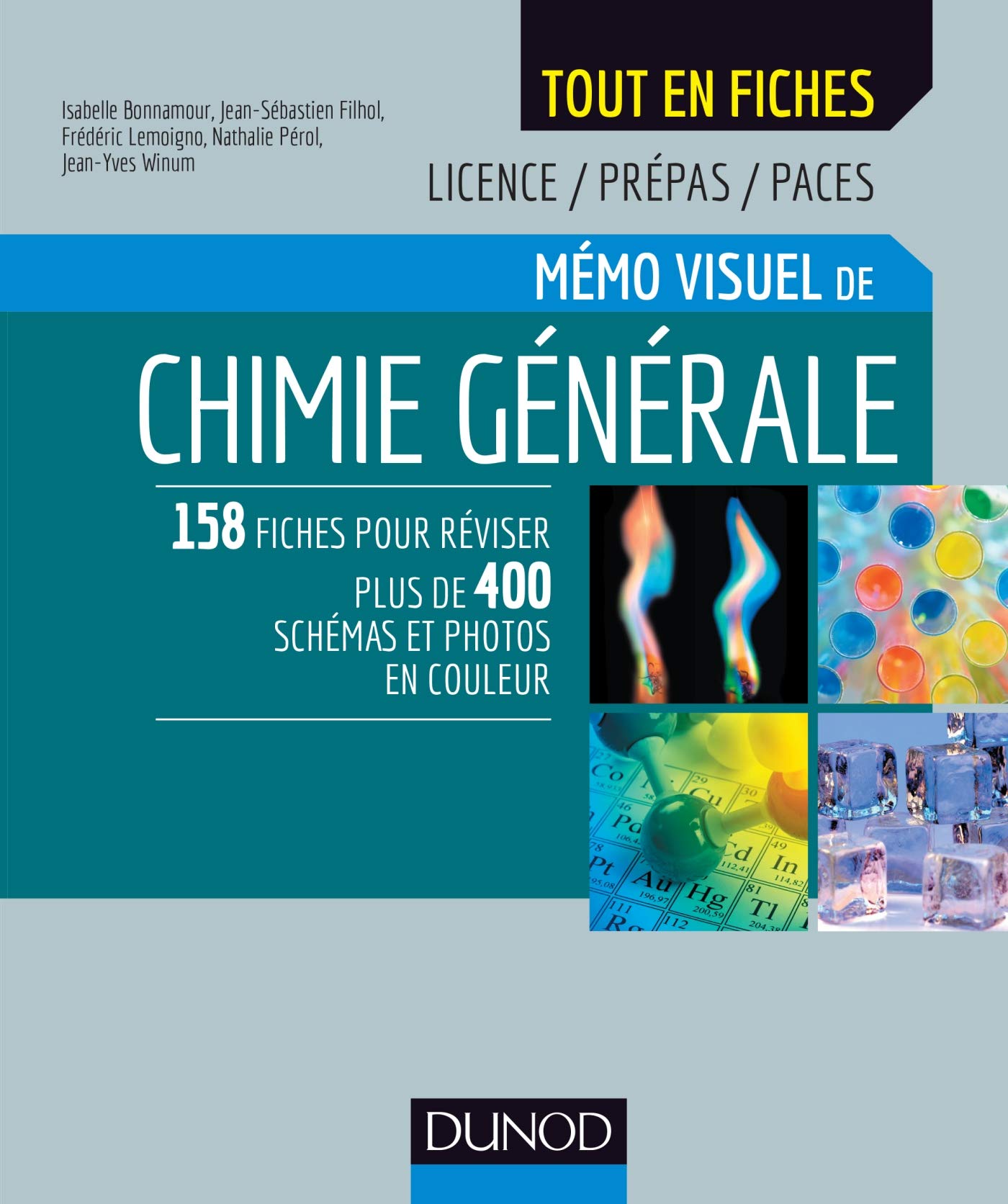 Jean-Sébastien Filhol, Frédéric Lemoigno and Jean-Yves Winum, lecturers in the Chemistry Department of the Faculty of Science, are co-authors with Isabelle Bonnamour and Nathalie Pérol (lecturers/researchers, University of Lyon) of the book Mémo Visuel de Chimie Générale published by DUNOD.
Jean-Sébastien Filhol, Frédéric Lemoigno and Jean-Yves Winum, lecturers in the Chemistry Department of the Faculty of Science, are co-authors with Isabelle Bonnamour and Nathalie Pérol (lecturers/researchers, University of Lyon) of the book Mémo Visuel de Chimie Générale published by DUNOD.
ZOOM
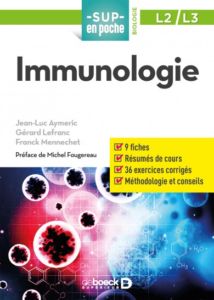 Immunology
Immunology
Jean-Luc Aymeric, Gérard Lefranc, Franck Mennechet
(Teachers at Montpellier University)
Understand and master immunology, thanks to worksheets combining course summaries and application exercises.
This book presents an up-to-date summary of immunology teaching at L2 and L3 levels. The worksheets, made up of course summaries, exercise statements and detailed answers, provide the essential basics that students need to master in order to pass their exams (or competitive examinations).
Each worksheet presents the main concepts and their uses.
The essentials to know, fundamental theoretical notions illustrated with examples:
=> A helping hand and methodological advice
=> Practical exercises with answers.
=> Corrected MCQs.
